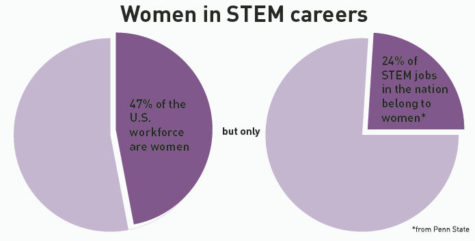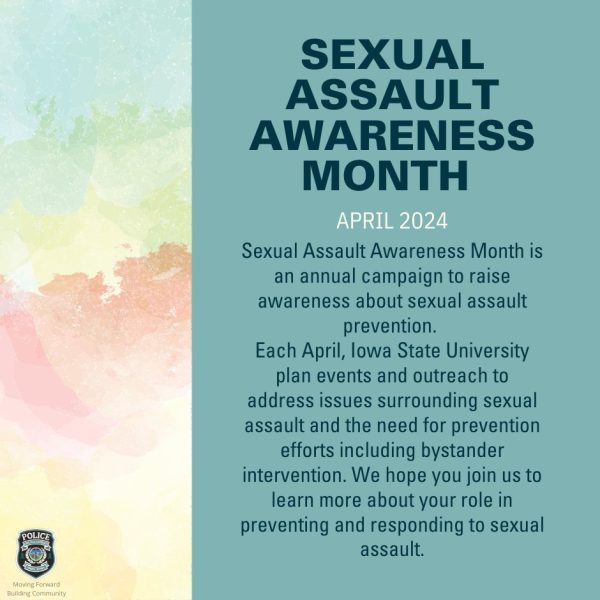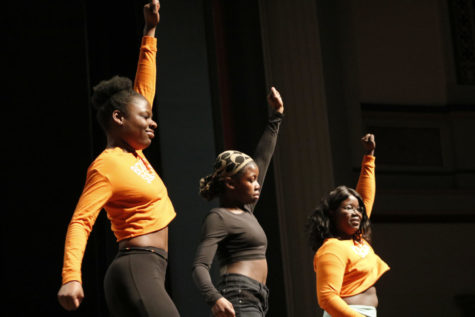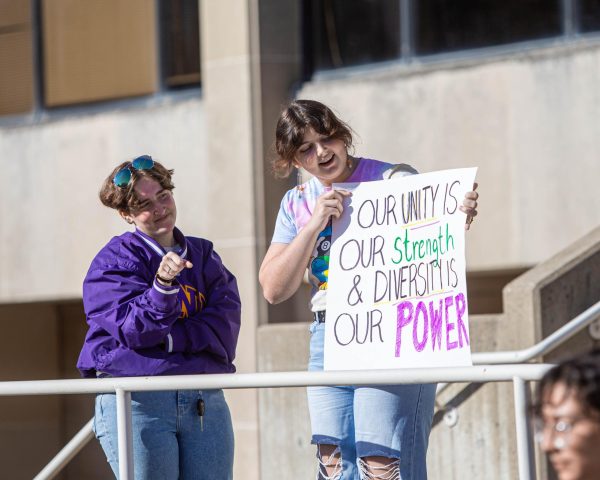Removing Exclusivity From the Gyst of all Things Feminist
November 6, 2020
Feminism is both the theory of political, economic and social equality of the sexes and organized activity on behalf of women’s rights and interests according to merriam-webster.com.
But what is feminism’s relationship with its male counter-parts given its inclusion of the syllable “fem” when according to general public belief it is for equality?
Paul Hengesteg serves as the program evaluation coordinator for the Center for Excellence in Learning and Teaching at Iowa State University. As a graduate student he minored in the Women’s and Gender Studies program which led to a further examination of social justice theories.
Hengesteg considers himself to be pro-feminist rather than feminist due to concerns of taking on the identity of oppressed groups and prefers to be an ally to the community. On a semi-regular basis, he encourages and utilizes his abilities to advance gender equality by voting.
“It’s a personal point of privilege and power that I have a say on what’s not right and what we want and need in this country,” said Hengesteg. “There’s a whole slew of people right now who are really nervous about their rights in the coming years because of [Supreme Court] Justice [Amy] Barrett so that’s why something as simple as a vote is so important, powerful and significant to me.”
Feminism covers a variety of topics, including reproductive rights, class and work, family dynamics, sexuality and many other items related to the systemic inequalities women face daily.
Donovan Sandoval is the club president of the Society for the Advancement of Gender Equity (SAGE) at Iowa State University. SAGE advocates for feminist goals and gender equity issues, including: Awareness of gender based violence, sexual assault issues, gender wage gap, perceptions of femininity and masculinity, gender expression and sexual preference, body image issues and other sociocultural issues analyzed through a feminist lens. SAGE co-coordinates ISU’s production of The Vagina Monologues according to the ISU student organization database.
“[Feminism is] the belief that everybody should be on equal playing fields regardless of race, religion, gender, sexuality all of those things,” said Sandoval. “Feminism is super misunderstood. People think feminism is just for women, that’s not true feminism is for everybody because in today’s age it’s more about promoting equality for everybody.”
As a self proclaimed feminist Sandoval oftentimes finds the revelations of today’s society to be both discouraging yet simultaneously inspiring of prospect. Throughout the many various waves of feminism one thing remains above all else, stereotypes. Some of the most recurring stereotypes about feminism according to amnesty.org are “Why are feminists so angry?”, “Does a feminist have to be female?” and “Will feminism hurt your career?”
“I don’t know if it’s angry that is the right term for that but if we do sit at angry, well wouldn’t you be angry if all of your rights have been secondary to someone else for 400 years?” said Hengesteg. “Wouldn’t you be angry if you couldn’t have the same rights and benefits as someone else and we need to be careful about angry it’s a very loaded and sometimes coated word but I definitely think the feeling of ‘Wait a minute I’m just as deserving of x, y and z as anyone else!’ So ‘why are feminists so angry?’ to some respects they deserve to be.”
“There’s different kinds of feminists, one like me promoting equality for all but there are some who are pushing for women to be in a higher position than men and reverse it instead of making it equal,” said Sandoval. “That gains a lot more media [attention] because it’s easier to get negative media than it is to get positive media. Though the word feminist sounds like female so a lot of people just assume it’s about women. Also it doesn’t help that with the 2016 election feminism got a lot of backlash so that really set it back as far as who can be involved from society’s perspective.”
Some of the occurrences of the the 2016 election in which Hirllary Clinton was the first woman running for president as the nominee of a major party brought about controversy surrounding feminism stemming from Clinton’s unchecked upper middle class and wealthy white women privilege, a serious inequality within the feminism movement as said in a medium.com article.
“I have a hard time believing that feminism or being a pro-feminist would in any way my career,” said Hengesteg. “Granted I’m looking for a career in academia where more liberal minds tend to prevail. Now holistically one can say ‘oh you know higher education is very conservative’ and that can be true, but from a collegiality perspective of who am I going to be working with I can only see benefits of understanding the importance of and believing in feminism.”
Graduate student Stephanie Gibb-Clark serves as a teaching assistant in the department of Womens and Gender Studies (WGS). In her role with WGS she has completed an in depth analysis of feminist theories. It is her belief that a vast array of complications arise from the definitive misnomer surrounding feminism. The most classic misconceptions portray feminists as pro-woman, anti-man, body hair loving, bra-burning, indignant women. Perhaps the best way to tackle these myths begins with contending the symbolic depiction of bra-burning feminists.
Erupting over 50 years ago in protest against a Miss America beauty pageant in New Jersey a group of women hurled mops, lipsticks and high heels into a “Freedom Trash Can”. Rumored to be included were undergarments, a gesture that made headlines around the world according to bbc.com. Regardless of the inaccuracy reported from the event as bbc.com said, it quickly transitioned into an international symbol of protest still cited to this day.
“It is kind of a misnomer that men haven’t historically been a part of the feminist movement because they’ve been there since the very beginning,” said Gibb-Clark. “In femininst theories (WGS 401) we read a piece that was written in the 1800s by a man talking about the ways in which wives are often referred to and treated as property, so men have always been there. One of the reasons that men’s involvement is invisibilized is because of the way that masculinity works. Women are socialized to become feminine just through watching other women, what women do, what they say, how they act. Men [traditionally] build their sense of manhood through different types of competition in a lot of ways and so by invisibilizing men’s independent involvement in justice work in the movement, men outside of the movement can grow together and sort of coalesce around a competition against women basically. So that is why men have almost always historically been seen as fervently against the feminist movement but today men are certainly more involved in the feminist movement publicly.”
“Our world can change if we all come together and one of the first steps [is] to acknowledge that there are [things] that may not affect you but as long as you realize that something out there, is affecting a majority of people [and] if you’re willing to listen to them and vote for the people who [represent] those who have been affected then I think that’s what really matters because we are supposed to support one another, care for one another, love one another and that’s really what feminism is,” said senior in criminal justice and SAGE member Alex Brown.
















